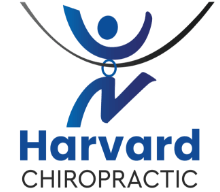Neck Pain Treatment in Harvard

Neck pain can disrupt your daily life, making it difficult to work, exercise, or even get a good night’s sleep. Whether your discomfort came on suddenly or has been building over time, our approach at Harvard Chiropractic focuses on identifying the root cause and restoring proper function to get you moving freely again.
NEW PATIENTS
What Causes Neck Pain?
Your neck supports the weight of your head while allowing an incredible range of motion in multiple directions. When joints become restricted or muscles develop tension, your body creates compensatory patterns that can lead to pain and stiffness. Common causes include poor posture, previous injuries, repetitive movements, stress, and everyday wear and tear.
Our Treatment Approach
The practice’s skilled chiropractors, Dr. Terry and Dr. Mitch, have extensive experience helping people with neck pain across all demographics, from athletes and weekend warriors to office workers and active retirees. We don’t just address symptoms. We look for the underlying dysfunction that’s driving them.
Through a comprehensive examination, we identify specific restrictions in your cervical spine and surrounding soft tissues. Care may include precise spinal adjustments combined with Active Release Technique, particularly targeting nerve entrapments that often contribute to neck pain and related symptoms such as headaches or arm discomfort.
Is Chiropractic Care Safe for Neck Pain?
Safety is a top priority in our practice. Multiple systematic reviews and meta-analyses, which represent the highest level of scientific evidence available, confirm that spinal manipulative therapy is both safe and effective for managing acute neck pain.
A 2025 systematic review and meta-analysis by Jacobs et al. found that cervical artery dissection (CAD) occurs in roughly 9 out of every 100,000 people, most of whom never develop symptoms. The study showed a moderate level of risk certainty in individuals with certain predispositions, such as migraine or MTHFR gene variants.
However, cervical spinal manipulation is not a significant risk factor for CAD. The review also confirmed that the rare vascular events sometimes linked to chiropractic visits are actually related to the symptoms that bring patients in for care, not to the care itself.
These findings align with a landmark 2008 population-based study by Cassidy et al., which analyzed over 100 million person-years and found no excess risk of vertebrobasilar stroke associated with chiropractic care compared to visits to primary care physicians.
Additional studies show that vertebral arteries do not experience tensile force during cervical adjustments (meaning the movement does not put enough strain on vasculature to cause injury) (Gorrell et al., JMPT 2023) and that spinal manipulative therapy is a safe and effective intervention for reducing neck pain, improving cervical range of motion, and decreasing disability (Diao et al., 2025).
Getting Back to What You Love
When you’re dealing with neck pain, everything becomes more difficult. Our goal is to restore healthy motion to your cervical spine and surrounding tissues, allowing your body to function the way it’s designed to. That means less pain, better mobility, and a return to the work, sports, and activities you enjoy.
If neck pain is limiting your life, we’re here to help. Contact Harvard Chiropractic today to schedule your comprehensive evaluation and start your path back to pain-free movement.
Resources
- Jacobs A, et al. Risk factors for cervical artery dissection: a systematic review with meta-analysis. Stroke and Vascular Neurology. 2025. PubMed
- Cassidy JD, et al. Risk of vertebrobasilar stroke and chiropractic care: results of a population-based case-control and case-crossover study. Spine. 2008. PubMed
- Gorrell LM, et al. Vertebral arteries do not experience tensile force during manual cervical spine manipulation applied to human cadavers. Journal of Manual & Manipulative Therapy. 2023. PubMed
- Diao Y, et al. Efficacy and safety of spinal manipulative therapy in the management of acute neck pain: a systematic review and meta-analysis. European Spine Journal. 2025. PubMed
- Anderson ML, et al. Patterns of initial treatment and subsequent care escalation among Medicare beneficiaries with neck pain: a retrospective cohort study. European Spine Journal. 2024. PubMed

